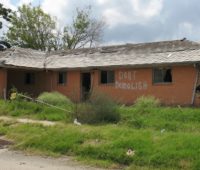Of the many sorry things about the contemporary United States that the Katrina catastrophe has exposed, perhaps none is more depressing than what it showed about the abiding divide in American thinking about race and racism. The televised and photographed spectacle of Katrina’s aftermath in New Orleans in particular revealed that the vast majority of […]
As analyses and “spin” of the Katrina crisis grow, we confront the sort of public issue to which a social science response is urgently needed. Accordingly, the SSRC has organized this forum addressing the implications of the tragedy that extend beyond “natural disaster,” “engineering failures,” “cronyism” or other categories of interpretation that do not directly examine the underlying issues—political, social and economic—laid bare by the events surrounding Katrina. Essays on this site explore a number of subjects related to:
- Structures of vulnerability, including the race, class, gender, and age of those suffering most
- Political projects that have distorted the pursuit of “homeland security”
- Bias that has sent federal resources disproportionately to rural areas and suburbs rather than cities
- Media coverage of the disaster
- Response from the American public
- Philanthropic and charitable responses
- The physical infrastructure on which cities depend (and its vulnerabilities)
- The implications of the Iraq War
- Problems of oil dependency and related infrastructures
- Environmental policy and global warming, wetlands management, etc.
- Costs of “privatization” and cuts in government capacity
- Leadership at every level
- Law enforcement and public order
- Predicting “emergencies” and responding to predictions
- The economic implications of catastrophic events
- Comparisons: to the recent Asian tsunami, to 9/11 in New York, to earlier hurricane disasters in the U.S., etc.
Leaving New Orleans: Social Stratification, Networks, and Hurricane Evacuation
by Elizabeth FussellThe world watched helplessly as thousands of New Orleanians were caught in the wake of Hurricane Katrina. While some blamed public officials for not responding soon enough, others blamed the victims for not evacuating when they knew the hurricane’s arrival was imminent. One fundamental insight of social science is to understand the illogic of blaming […]
Katrina’s Political Roots and Divisions: Race, Class, and Federalism in American Politics
by Dara Strolovitch, Dorian Warren and Paul FrymerIn the public imagination, natural disasters do not discriminate, but are instead “equal opportunity” calamities. Hurricanes may not single out victims by their race, class, or gender, but neither do such disasters occur in historical, political, social, or economic vacuums. Instead, the consequences of such catastrophes replicate and exacerbate the effects of extant inequalities, and […]
Our Toxic Gumbo: Recipe for a Politics of Environmental Knowledge
by Scott FrickelContemplating the radioactive cloud drifting across West Germany from Chernobyl nearly twenty years ago, the German sociologist Ulrich Beck famously observed that “poverty is hierarchic, smog is democratic.” This was another way of saying that the wealthy among us could no longer buy their safety from invisible new dangers. Others taking issue with Beck’s catholic […]
Women and Girls Last? Averting the Second Post-Katrina Disaster
by Elaine EnarsonThe fault lines of American society, as much as the failings of its infrastructure, are shamefully on display in the aftermath of Hurricane Katrina. Race, class, age and (dis)ability are now at the heart of the public debate about vulnerability, preparedness and emergency response, but this is also a story, as yet untold, about women […]
Finding and Framing Katrina: The Social Construction of Disaster
by Havidán Rodríguez and Russell R. DynesFor the past several weeks, the major programmatic themes and news headlines generated by the media, but particularly television, have centered on hurricanes, specifically Hurricane Katrina, and more recently, Hurricane Rita. These themes have provided graphic glimpses of the human toll and suffering that such disaster events can have; but in drawing these pictures, television […]
Seeing and Not Seeing: Complicity in Surprise
by Virginia R. DominguezSeptember 11, 2005 Saddened, surprised, shocked. By now these words are everywhere, brought to us by the media in OpEd pieces, newspaper editorials, interviews with caring observers, consultants, and celebrities. The sadness and the shock are, to be sure, in part about the physical collapse and devastation of a battered, flooded city. But it is […]
An Imperfect Storm: Narratives of Calamity in a Liberal-Technocratic Age
by Alex De WaalLeft speechless America is distressed by Hurricane Katrina. Two weeks after the hurricane struck Louisiana and Mississippi, America is just beginning to emerge from the phase of raw bewilderment, in which the crisis is not just a threat to lives and livelihoods but also to the nation’s political imagination. Watching some television footage in an […]
The Geography of Social Vulnerability: Race, Class, and Catastrophe
by Susan CutterIt was bound to happen. The scenario had been researched, rehearsed, and replayed over and over again among emergency managers. It was just a matter of when and where the major hurricane would strike a large American city. Two specific scenarios had been considered—a major hurricane with 20 foot plus storm surge inundation affecting the […]
Worst Case Katrina
by Lee Clarke“It is going to be about as ugly of a scene as I think you can imagine,” said the homeland security chief for the US government, on 5 September 2005. With that, Michael Chertoff understated the essence of Katrina in a nutshell. It was beyond imagination, actually imaginations, of so many. The great sadness is that […]













